Editor’s note: To help voters make informed choices in the Sept. 3 Democrat and Republican state primaries, the Plymouth Independent reached out to all the candidates seeking to represent Plymouth in the House of Representatives and Senate. We focused on contested races, but plan another story before the general election in November.
The deadline to enroll as a voter in time for the primary is Aug. 24. Those who are registered as unenrolled – meaning they have no party affiliation – can choose a Democratic or Republican ballot in the primary.
For more information on registering and how to cast a ballot, go here.
Democratic candidates for state representative
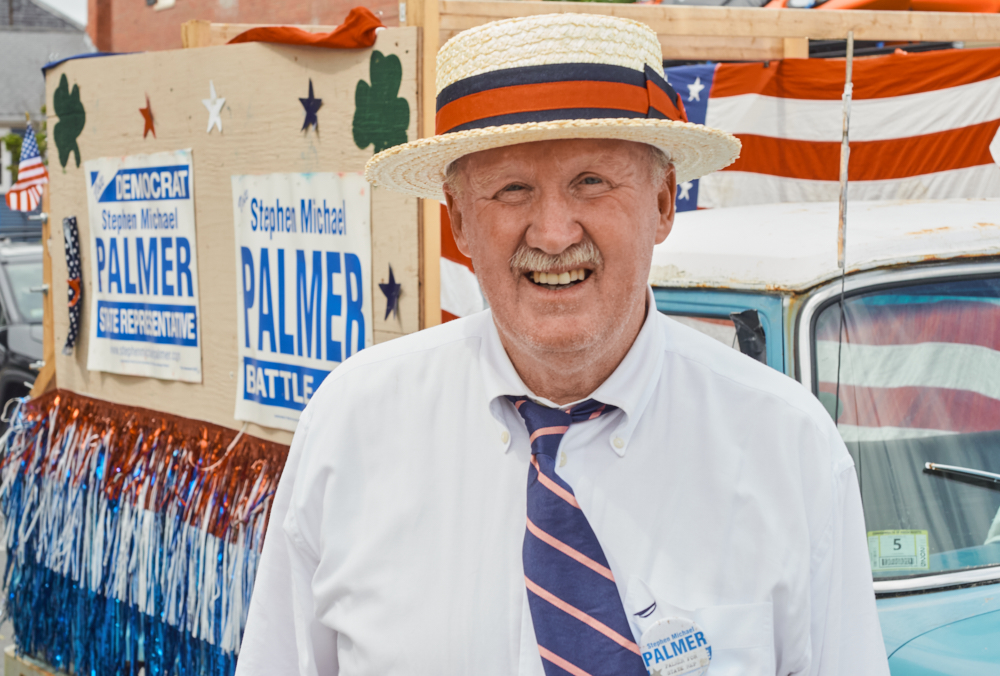
On a recent day, Stephen Michael Palmer parked his vintage blue-and-white Ford F-100 pickup truck in front of Town Hall. It was adorned with an American flag, tinsel, and a sign that read: “Have you had enough?”
Palmer, 68, sporting a white shirt and straw boater, held another sign that read: “Democrat Stephen Michael Palmer” on which he has handwritten the word “still.”
It means that Palmer is still a candidate – he’s sought elected office in Plymouth many times over the years.
“I’ve run a few times,” Palmer, chair of the Plymouth Redevelopment Authority and vice chair of the Plymouth Affordable Housing Trust, said in an interview on a bench beside his truck.
This time, he is running for the Democratic nomination for state representative in the 1st Plymouth District in the primary. The district encompasses all of Plymouth except for downtown, North Plymouth, and parts of West Plymouth. The seat is open because incumbent Matt Muratore, a Republican, is running for the state Senate seat being left open by Democrat Susan Moran, who is not running for re-election.
Palmer is one of four Democrats on the ballot. He faces Plymouth School Committee Chair Michelle Badger, Plymouth Area Chamber of Commerce Chair Scott Hokanson, and former Citibank executive Arthur Desloges.
Palmer opposes legalized abortion and supports prayer in public schools.
Asked whether he wanted President Biden to drop out of the presidential race and whether he is pleased with Kamala Harris as the Democratic presidential candidate, he replied: “I vote the party line.”
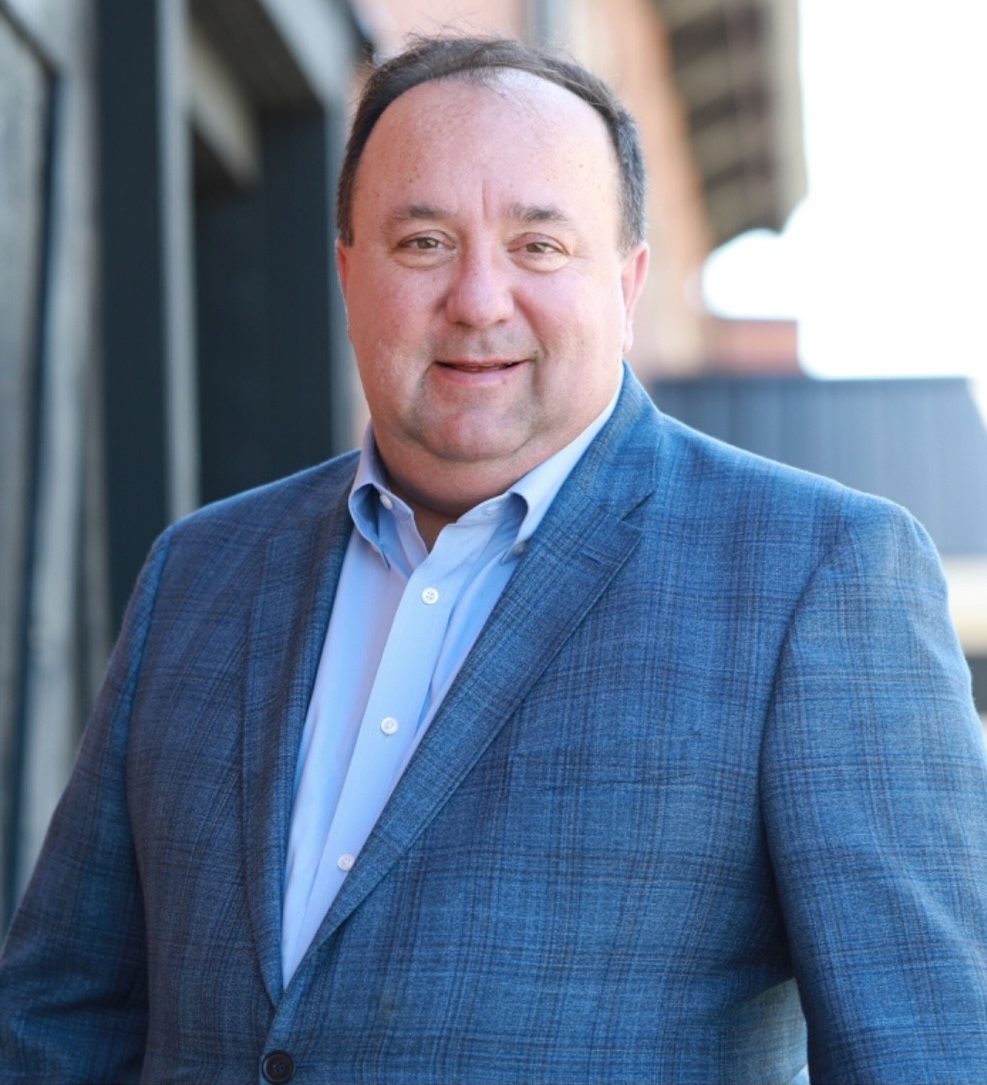
Asked that same question, Hokanson, 52, said: “I was absolutely relieved when Joe Biden stepped down.” He called Harris “absolutely the right choice for 2024.”
Hokanson has served on the Planning Board. He founded Brabo, a benefits and payroll company that employs 25 people at its offices in Cordage Park (and recently opened a satellite office downtown).
He says he can bring empathy to Beacon Hill based on personal experience. There was a time when his family was on MassHealth and collecting food assistance, he said. Hokanson said he also understands what it means to collect unemployment.
“I know what it’s like not to have food in the house,” he said.
Hokanson said that, if elected, he would focus on making health insurance more affordable for individuals. He would also make affordable housing a priority. He cited the Plymouth Area Chamber of Commerce’s support for a town bylaw that allows owners of single-family homes to build a second housing unit on their property without a special permit, which passed Town Meeting in May. (Governor Maura Healey has since signed a similar state law allowing accessory dwelling units.)
Hokanson said he is passionate about creating different paths for success for students attending public schools. For his first three children, he said, he thought college was necessary. But as he ponders what would be good for his other two children – ages 16 and 14 – he envisions other possible routes to a career.
“College is an option, but it’s absolutely not necessary,” he said.
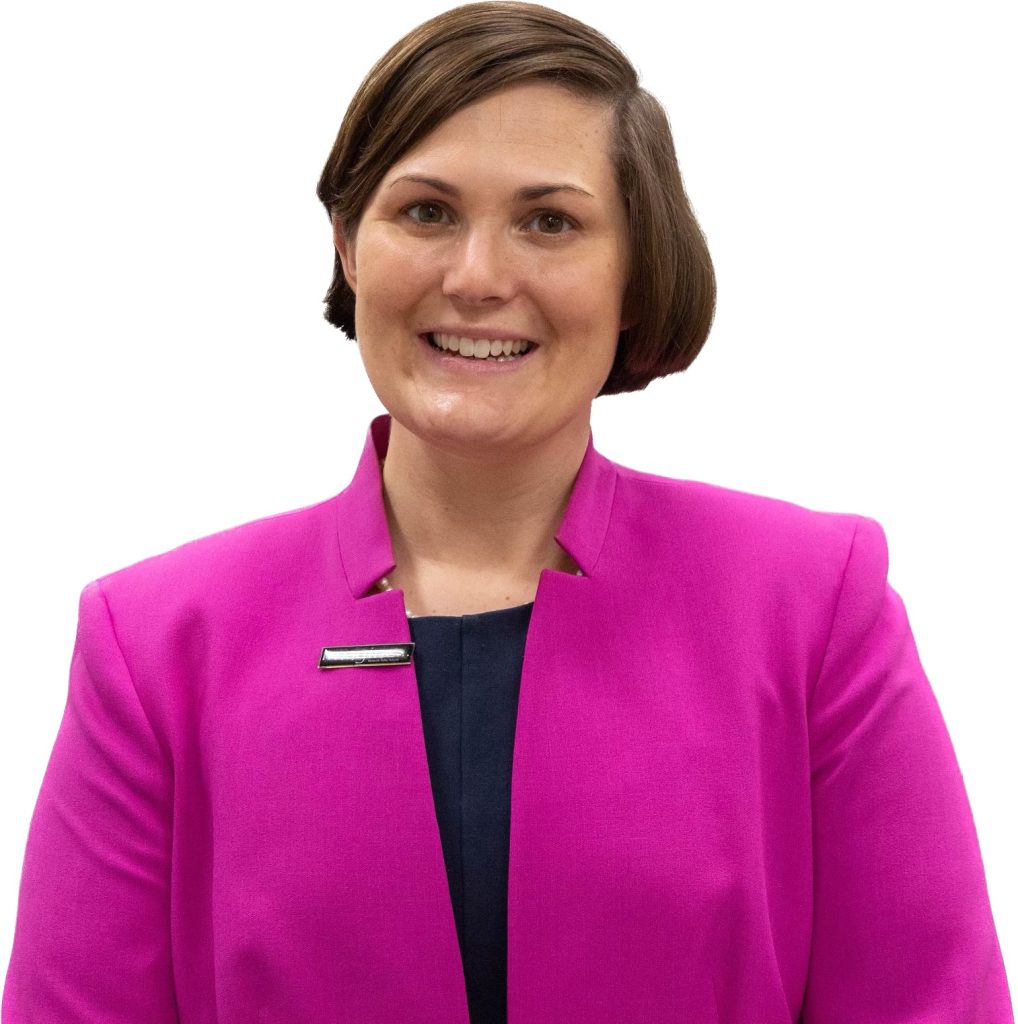
Badger, like Hokanson, opposes MCAS – the Massachusetts Comprehensive Assessment System – which students must pass to receive a high school diploma. Massachusetts voters in November will decide whether it remain as a graduation requirement through a ballot question.
“I’m for MCAS going away,” she said. “We need to find another way to evaluate our students.”
Badger cited anxiety among students as one reason to eliminate the MCAS requirement. But even if it is abandoned, she said, it remains important to maintain statewide standards for what is taught. Another way to measure whether students have learned what they are taught, Badger said, could be to create a portfolio of their work. Smaller tests that require less preparation might be another approach, she said.
“MCAS takes chunks of time out of school,” Badger said. “It takes some of the creativity out from our wonderfully creative faculty members.”
Badger also favors continued statewide funding of free breakfast and lunch for all students.
She said Biden did the right thing by stepping aside and supports Harris.
“It’s changed the excitement in the race completely,” she said.
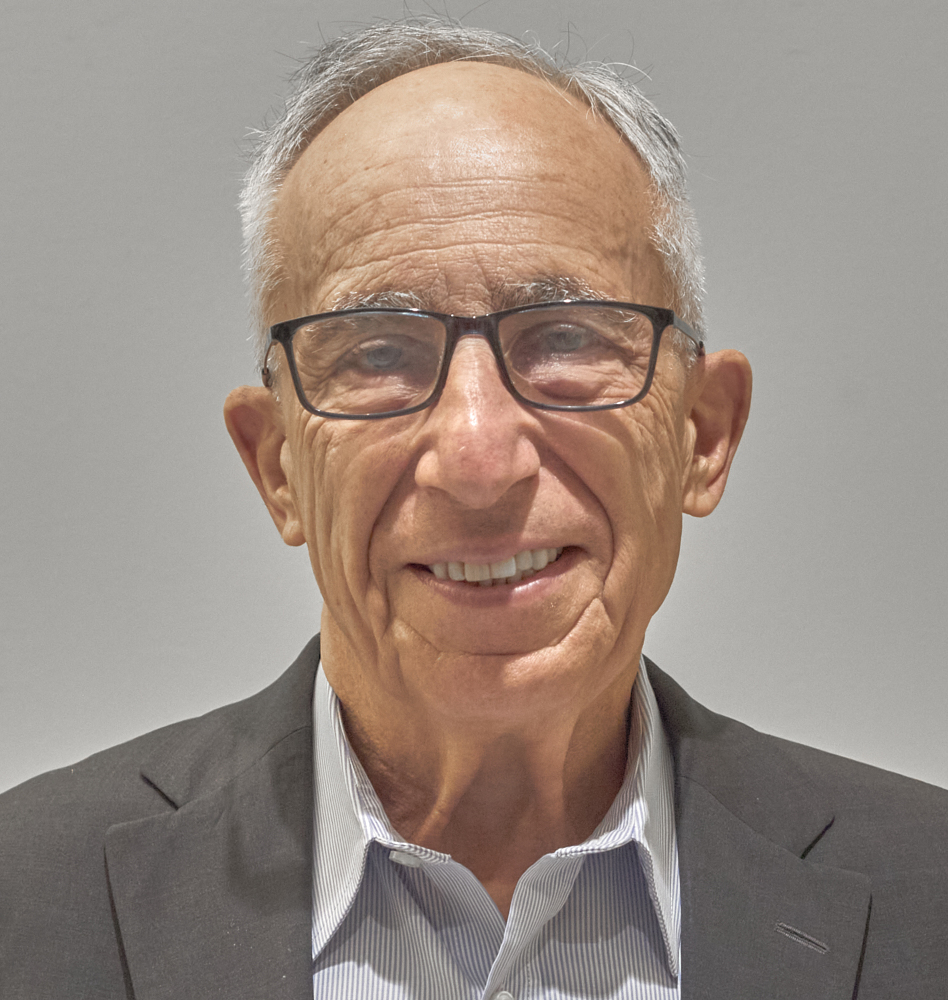
For Desloges, personal tragedy has been a motivator. He lost his son to a heroin overdose eight years ago. Several years later, his wife died.
“My family was gone,” he said. “I didn’t know what to do. I was lost.”
Desloges, 74, a retired Citibank executive, said he eventually found purpose in public service. As part of pursuing a master’s degree in public policy at Tufts University, he started interning with state legislators.
He also became a steering committee member on the Save Our Bay Coalition, an advocacy group that has pushed to stop the discharge of radioactive water from the former Pilgrim nuclear power plant into Cape Cod Bay. The state has told Holtec Decommissioning International, the company dismantling the plant, that it may not discharge water into the bay. But the state has also said Holtec does not need a permit to discharge radioactive water vapor into the air.
Desloges has been working on legislation to place a moratorium on such discharges. If elected, he said, he promises to introduce that legislation.
But his primary purpose in seeking to become a state representative stems from his losses. Not long before his wife died, Desloges said, she asked him to work to end the criminalization of drug addiction – and the stigma associated with it.
“That’s why I’m running,” he said. “I know exactly what it feels like to get that way-too-loud knock at the door at two in the morning.”
Regarding the national political landscape, he is on board with Biden’s decision to pass the baton to Harris.
“I agree with leading Democrats that it was time for President Biden to step aside and unite behind Kamala Harris,” he said.
Desloges is largely financing his own campaign. As of July 31, according to the Massachusetts Office of Campaign and Political Finance, he had raised $24,224 this year, but that includes $20,000 he loaned his campaign. Badger had raised $16,557, Palmer $8,000, and Hokanson $7,724.
Republican candidates for state representative

Dee Wallace Spencer has outraised Jesse Brown, $68,611 to $29,315. Both candidates have used some of their own money to fund their run. Wallace Spencer has loaned her campaign $26,000, while Brown has loaned his campaign $11,510.
Wallace Spencer, 57, said she was motivated to run by hearing the stories of her sons’ friends who said they could not afford to live in Plymouth.
“A lot of our policies are crushing the middle class and it’s people that I care about that are getting crushed,” she said.
Wallace Spencer is a principal lecturer at Northeastern University and owns a business, Shea Vance, that buys, renovates, and sells real estate, and also rents equipment.
Part of the problem on Beacon Hill, she said, is Democrats’ control of the governor’s office and both houses of the Legislature.
“There’s no robust discussion,” she said. “There’s no debate. There’s rubber stamping. So we need to bring a balance to our Legislature.”
Wallace Spencer’s father, Tom Wallace, was one of the original proponents of the Pinehills development, which only won approval after a long and contentious process. In the 1990s, she ran a series of econometric analyses to predict the impact of different kinds of development in Plymouth and helped survey Town Meeting members to see what kind of development they wanted. She also co-authored Plymouth’s Open Space Mixed Use Development bylaw that governs the development of the planned community.
During an interview, she declined to say whether she supported Trump’s candidacy for president. Four days later, she provided an email response to the question.
“I am running for state representative to take care of my community and to give Plymouth a strong voice in the Legislature,” Wallace Spencer wrote. “My community and I care about affordability, lower taxes, small business development, secure borders, and public safety: these are all Republican policy priorities, and I will vote for all Republicans on the ballot.”

Affordability is also the reason Brown, Wallace Spencer’s primary opponent, gives for running.
Like her, he describes himself as an advocate for law enforcement. Each cites a police endorsement: Wallace Spencer’s is from the Massachusetts Coalition of Police; Brown’s is from the Massachusetts Fraternal Order of Police.
Brown, 46, said he will push to lower the state sales tax from 6.25 percent to 5 percent.
He blames Massachusetts’ commitment to renewable energy for high utility costs. At the same time, he calls himself a big proponent of the so-called blue economy, which advocates for the sustainable use of ocean resources to create jobs while preserving the health of ocean ecosystems. He cites aquaculture, which includes oyster farming, as one way Plymouth can benefit from the movement.
“We live on one of the biggest coastlines in Massachusetts, so capitalize off of it, but also maintain it and keep its cleanliness and its beauty,” Brown said.
Massachusetts House Democrats currently outnumber Republicans 133-25. (One member is unenrolled and one seat is vacant.) That could pose a problem for a Republican trying to get something accomplished. Asked how he could work with Democrats to pass legislation, Brown, a Marine veteran, said he has a proven record of working with everyone, especially in business and through his nonprofit. His company, Heidrea Communications, installs cellphone towers, and his nonprofit, Heidrea for Heroes, assists veterans.
He said he supports Trump for president.
In Plymouth’s other State House district, the 12th Plymouth – which includes downtown, North Plymouth, and parts of West Plymouth, as well as Kingston, Plympton, and parts of Hanover, Middleborough, and Pembroke – Democrat Kathleen LaNatra and Republican Eric Meschino are running unopposed.
Republican candidates for state Senate
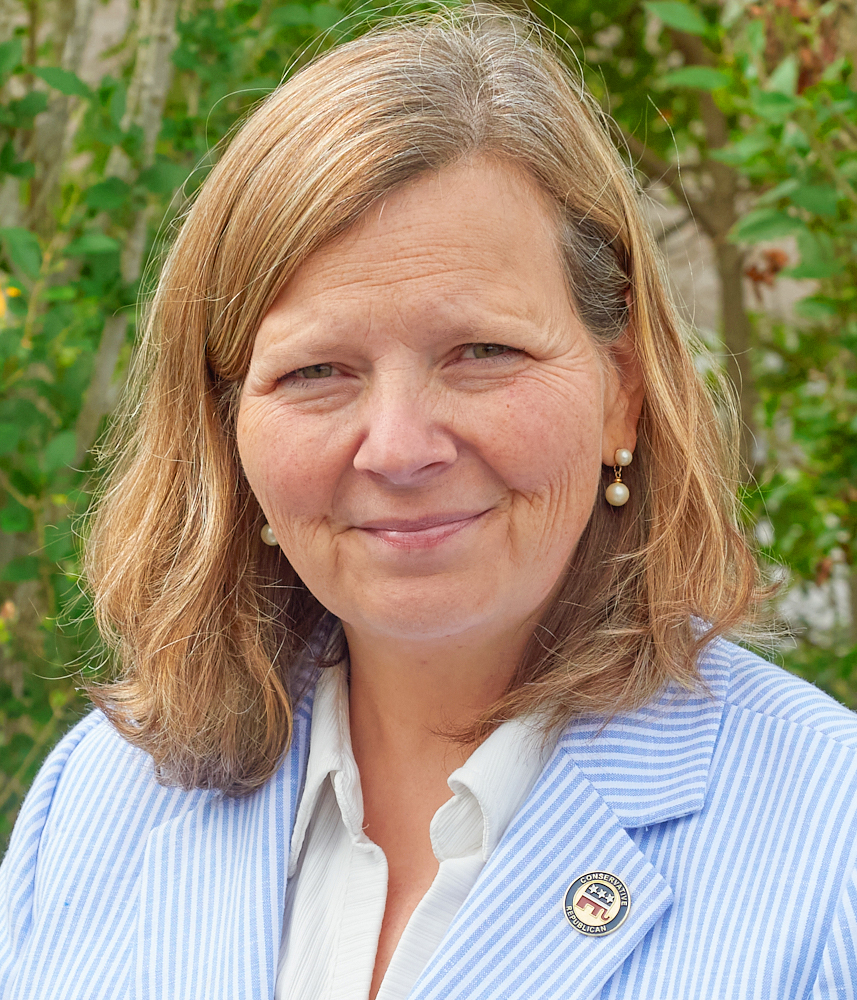
In the Republican primary for state senator for the Plymouth and Barnstable district, Bourne School Committee member Kari MacRae is running against state representative Matthew Muratore. The district includes Plymouth, Bourne, Kingston, Pembroke, Plympton, Falmouth, Mashpee, and Sandwich.
MacRae, 50, positions herself as a conservative alternative to Muratore, who has worked with Democrats on legislation.
“We need to end the right to shelter law,” MacRae said, referring to the state law that obligates Massachusetts to offer shelter to those in need.
MacRae said she supports Trump.
“Of course I do,” she said.
As a member of the Bourne School Committee, MacRae opposed teaching students about gender identity.
“There are certain things that should not be taught in schools,” she said. “We shouldn’t be teaching children that they can choose to be a boy or a girl.”
She also opposes allowing transgender girls to play on girls’ sports teams.
In 2021, MacRae was fired from her job as a math and business teacher at Hanover High School over her social media posts, including a TikTok video in which she opposed teaching about gender identity and “critical race theory.”
MacRae sued the Hanover Public Schools in federal court, alleging that it violated her First Amendment right to free speech. In September, U.S. District Court Judge Denise Casper dismissed MacRae’s case. She appealed to the First Circuit, which upheld Casper’s ruling. MacRae said she is working on an appeal to the Supreme Court.
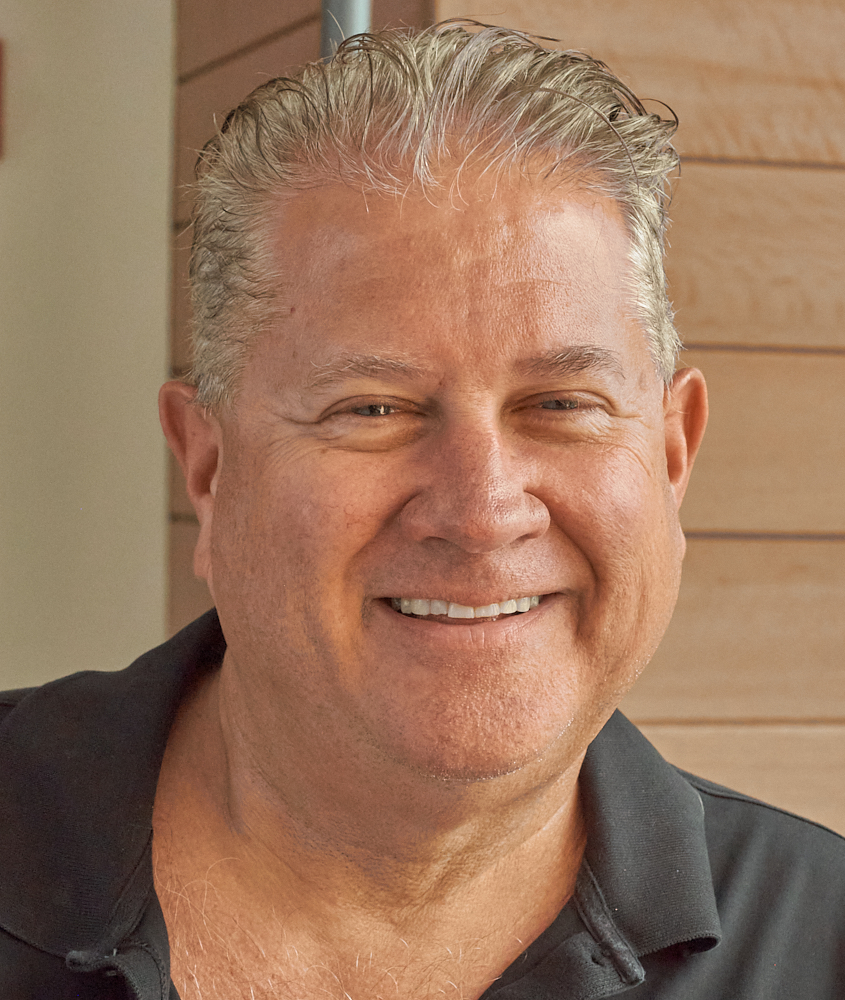
Muratore, 63, said he is proudest of his efforts to secure state funds for Plymouth, including money for infrastructure and to help To the Moon and Back – a local nonprofit that supports the adoption of children born with opioid exposure – get started.
If elected to the Senate, he, too, wants to tackle the housing problem. Muratore said his campaign volunteers have knocked on 7,000 doors, and they often hear people raise the issue. He said he would like to push for more tax cuts.
Muratore said working across the aisle with Democrats has been important, but he also considers that party’s control of the State House problematic because it negates Democrats’ need to reach across the aisle.
“I’m a big believer in collaboration,” he said. “That’s why I think the whole balance of power is helpful, because the more we collaborate together, the better off we’re going to come up with some good ideas.”
He said he wants to continue working on the issue of migrants, which he said is tied to the problem of affordable housing because migrants compete for housing with everyone else seeking it.
Muratore is a founding partner of EF Senior Care. Patrick Flaherty, another founding partner, is a Plymouth Independent board member.
Responding to a voicemail asking whether he supports Trump, Muratore sent a text.
“I have been a lifelong Republican,” he wrote, “and I will support Republican candidates up and down the ballot. However, this race is not about national politics, but about maintaining a balance of power in Massachusetts politics.”
As of July 31, Muratore had outraised MacRae, $76,330 to $24,648.
Democratic candidate for state senator
The winner of the Muratore-MacRae race will go on to face Democrat Dylan Fernandes in the general election in November. Fernandes is now a state representative representing Martha’s Vineyard, Nantucket, and parts of Falmouth. He is running unopposed in his primary.
Fred Thys can be reached at fred@plymouthindependent.org.

